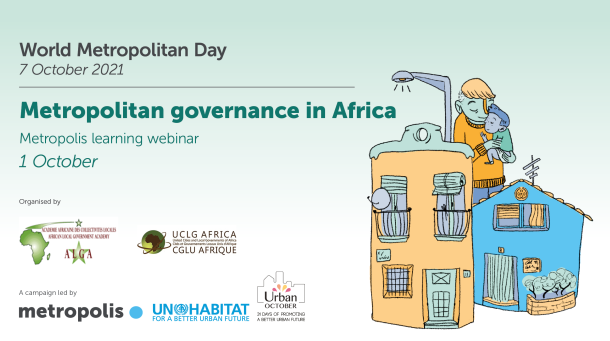INTERNATIONAL
CALENDAR
CALENDAR

The metropolitan governance in Africa: models of metropolitan governance
According to the latest Global Report on Local Democracy and Decentralization (GOLD IV), 1.6 billion people (41% of the total urban population) currently live in metropolitan areas and over 600 million new inhabitants are predicted by 2030. The Asia-Pacific region dominates the global urban system, since it is home to 47% of the world’s urban population and 45% of the metropolises in the world. Following behind are Latin America and the Caribbean, which have 13% of the urban population and 14% of the metropolitan areas, and Africa, with 12% and 11%, respectively.
Increasing urbanization not only makes it more difficult to understand where the administrative boundaries of a city begin and end, but also how the rapid expansion of the territory makes it more and more difficult for the different actors within a territory to reach decisions about how to address the challenges arising from economic, social and environmental issues.
Metropolitan governance, "a process of coordination of actors, social groups and institutions with the intention of achieving debated objectives that have been collectively discussed and defined in fragmented environments" (Borraz and Le Galés, 2001: 350) can be the key to responding to the challenges of urban agglomerations and providing real equality of opportunities, incorporating gender mainstreaming into the concept of governance itself.
In Africa, the diversity of governance actors and agendas has made addressing urban problems complicated, but it can also be seen as an opportunity to harness additional skills and resources through collaborative urban governance processes that bring together different actors and stakeholders to develop and implement more holistic and inclusive strategies. In addition, the adoption by several levels of governments of Global agendas like the 2030 Agenda for Sustainable development, the Paris Agreement, the Addis Ababa Action, the Sendai Framework for Disaster Risk Reduction and the New Urban Agenda require sustainable urbanisation and for our purposes sustainable metropolisation .
As it is stated in the Metropolis Issue paper 03: The metropolitan scale of resilience, operating with metropolitan lenses favours the achievement of resilience goals and fosters sustainability, social cohesion and quality of life in the major metropolises. Having that in consideration, we reckon that resilience becomes another aspect that strengthens metropolitan governance, while its very existence is a guarantee for the success of resilient strategies.
In this first webinar, to be held on 1 October at 13.00h CET, in the framework of the World Metropolitan day, we will analyse the different models of metropolitan governance, how to incorporate the gender vision in metropolitan governance and how to achieve a more equitable governance.
Registration here: https://us02web.zoom.us/meeting/register/tZcsdeCppj8iEtFF4SIblINS80OAoDACWvgM

